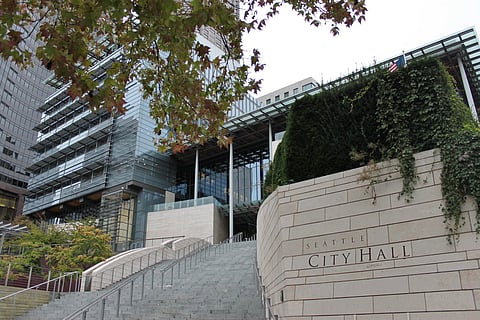The 20 Applicants Looking to Fill Seattle City Council's District 2 Seat
When former District 2 Councilmember Tammy Morales announced her resignation from the Seattle City Council effective Jan. 6, everyone had the same question: Who's going to represent South Seattle now?
According to the City Charter, the council has 20 days to fill a vacant council seat, which means they have until Jan. 27 — 20 days after Morales' official resignation. The person they choose will serve until November, when a special election will be held for voters to choose a representative who will serve the remainder of Morales' term through 2027.
Yesterday, the Seattle City Clerk posted a list of the 20 qualified applicants they are considering for the position. Requirements to qualify, as denoted in the City Charter, include being a United States citizen, possessing the ability to read and write in English, being an active registered voter in Seattle, and residing in District 2, which stretches from Chinatown-International District down to Rainier Beach.
Here are the Seattleites vying for the open seat:
Henry M. Armas-Amaya, a CID resident and former microfabrication technician at RJC Enterprises. "My first-hand experience with some of the most prominent issues within this community and those around it might be able to provide an understanding on how to solve them," Armas-Amaya wrote in his application.
Nimco Bulale, founder and CEO of a political consultancy firm, South Sound Strategies, and campaign manager for the successfully passed Seattle housing levy. She also ran in the 2022 primary for 37th District State Representative. Bulale emphasized the importance of public safety in District 2 and inclusive policies.
Hong Chhuor, currently the chief development and communications officer for Friends of the Children-Seattle and has previously worked with El Centro de la Raza, the Asian Counseling and Referral Service, and other nonprofits. In his cover letter, Chhuor highlighted his passion for advancing public safety, supporting a vibrant local economy, and addressing homelessness.
Nahom Debessay, an active member of the city's Eritrean community and a project manager in health care IT. Debessay said his background drives him to advocate for inclusivity, equity, and economic development.
Adonis E. Ducksworth, a senior transportation policy and operations manager in Mayor Bruce Harrell's office and previously the deputy chief of staff for the Seattle Department of Transportation. Ducksworth voiced support for combating addiction, mental health issues, and homelessness within the city, and hiring more police officers.
Takayo M. Ederer, a real estate investor who grew up and still lives in Columbia City. She highlighted public safety and crime, homelessness and housing affordability, supporting local businesses, transportation, and the environment as significant issues within the city.
Randy Engstrom, cofounder of Third Way Creative and the former director of the Seattle Office of Arts and Culture. Engstrom mentioned public safety, homelessness, and racial justice as his political priorities.
Thaddaeus J. Gregory, a land-use lawyer who previously worked with Van Ness Feldman, said he is disappointed in the One Seattle comprehensive plan update and wants to be involved in the processes to create them.
Romain R. Harris, an insurance agent with his own company, wrote that he wants to focus on public safety and serving underserved communities.
Edward C. Lin, an assistant city attorney with the contracts and utilities division of the City Attorney's Office. He mentioned investing in public education and protecting the Chinatown-International District in his application, among other things.
Alex Morrison, a marketing and communications manager for a general contracting company. Morrison wrote that as a political independent, he would approach issues with an open mind.
Erik L. Nielsen, a contracts negotiator at Boeing. Nielsen wants to improve transportation safety and accessibility, address displacement and housing affordability, foster public safety and community resilience, and tackle homelessness.
Rachel Ramseur, a real estate broker and former police officer, wrote that she wants to focus on creating more affordable housing and supporting small businesses.
Bishop R. Rogers, executive director of the homelessness outreach organization Circle of Love Outreach and the presiding bishop at Seattle's Full Gospel Pentecostal Assemblies. Rogers voiced support for advancing public safety, the creative economy, and clean energy.
Chukundi Salisbury, sustainability and environmental engagement manager at the Seattle Parks and Recreation Department. Salisbury ran in the 2020 general election for 37th District State Representative. Equitable development and environmental stewardship are a few of the critical issues he's passionate about.
Steven Sloan, founder and owner of his own public relations agency. Sloan wrote that one of Seattle's pressing challenges is its housing crisis, which he would address through equitable urban development.
Mona Smith, an attorney with her own law firm and board member (and former cochair) of the LGBTQ Victory Fund. She emphasized her involvement in public policy and advocacy.
Mark A. Solomon, a crime prevention coordinator with the Seattle Police Department, lost to Morales for the District 2 Council position in 2019 and was a finalist for last year's council appointment.
Mark Sztainbok, a software engineer, believes District 2's biggest issue is crime and wants to work with SPD and the community to improve public safety.
Nakita Venus, executive director of Seattle's LGBTQ Center, is focused on promoting and advocating for public health, social justice, and sustainability. Venus resides in Hillman City.
As a 501(c)(3) organization, the South Seattle Emerald™ cannot endorse candidates or political campaigns.
Help keep BIPOC-led, community-powered journalism free — become a Rainmaker today.


